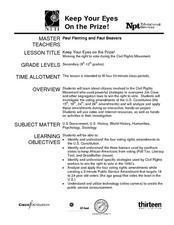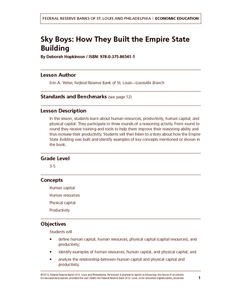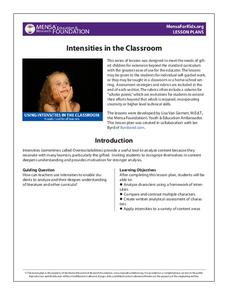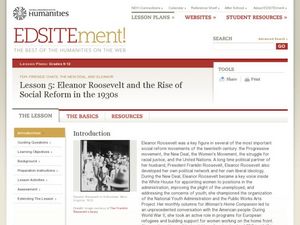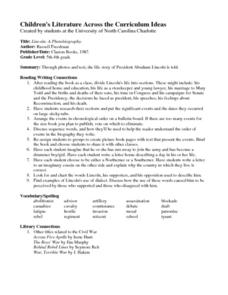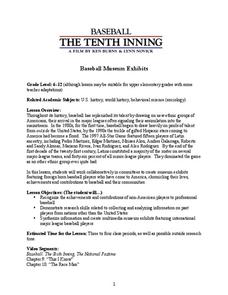Foreign Policy Research Institute
Ancient History: The Importance of Logistics in Greek & Roman Armies
Before one can understand the military tactics practiced throughout history, he needs to become familiarized with tactics practiced in the ancient past. Learners take a critical look at the military logistics used by Alexander the Great...
Advocates for Human Rights
Nativism and Myths about Immigrants
Where do anti-immigrants myths come from, and how can they be refuted? Learners critically analyze media reports and how to identify reliable sources. After studying a timeline that details the history of US nativism, groups research the...
Montana State University
What's the Weather?
How many jackets do you need to stay warm and climb Mount Everest? An informatie resource covers the topic of Mount Everest, the resource helps young scientists discover the difference between climate and weather. Activities include...
Anti-Defamation League
The Skin I’m In: Discussion Guide for Grades 8 and Up
Words can hurt! But self-esteem can blunt the impact. That's the takeaway when discussing the themes in Sharon G. Flake's powerful novel The Skin I'm In. A discussion guide leads groups through a study of this narrative of a girl who is...
Curated OER
Keep Your Eye On the Prize
High schoolers learn about citizens who were actively involved in the civil rights movement, and the strategies they used to overcome the Jim Crow laws that were so prevalent in the 1960s. They investigate the voting amendments of the US...
Curated OER
India: Is Terrorism Hurting the Economy?
Students investigate the effect of terrorism on the Indian economy. They conduct research on terrorist activity in India, create a timeline, and participate in a summit between Indian and Pakistan.
Curated OER
Lesson 1: English-Indian Encounters
What did the English settlers think of the Native Americans inhabiting the Chesapeake region of the United States? Learners analyze a series of documents and images to determine the English perception of the local inhabitants. A great...
Benjamin Franklin Tercentenary
Franklin’s Fair Hand American Journalism
Scholars know him for his role in the American Revolution, but Ben Franklin was also a journalist and printer. Learners investigate his standards for what was fit to print using primary sources—including writings where Franklin explains...
Historical Thinking Matters
Spanish-American War: 1 Day Lesson
After analyzing newspaper articles portraying different perspectives of the explosion of the Battleship USS Maine, your young historians will take a stand on which position is the most believable in both discussion and writing.
Curated OER
The Chesapeake Bay in Captain John Smith's Time
When Captain John Smith visited the Chesapeake Bay in the summer of 1608, what types of animals and habitats did he encounter? Your young historians will analyze primary source documents to answer this question, as well as compare the...
Roy Rosenzweig Center for History and New Media
Analyzing Political Campaign Commercials
Imagine a lesson that models for learners how to separate facts from opinions. How to detect bias. How to evaluate a source of information. How to identify propaganda. Although designed for middle schoolers, the activities in this packet...
National Endowment for the Humanities
David Walker vs. John Day: Two Nineteenth-Century Free Black Men
What was the most beneficial policy for nineteenth-century African Americans: to stay in the United States and work for freedom, or to immigrate to a new place and build a society elsewhere? Your young historians will construct an...
Federal Reserve Bank
Sky Boys: How They Built the Empire State Building
How tall is the Empire State Building? Lead your class through a collaborative estimation activity to determine the number of quarters it would take to reach the top and teach the following concepts: human capital, human resources,...
MENSA Education & Research Foundation
Intensities in the Classroom
Everyone learns and experiences life differently. A set of lessons about character intensities encourages middle and high schoolers to analyze themselves, their peers, and characters from a book based on the five listed intensities:...
Media Education Lab
Propaganda in Context
"Board Game Helps Fight Real World Ebola," a video produced by Voice of America, provides the text for a guided instructional activity that asks viewers to analyze the propaganda techniques used in the video. Groups then select a example...
Curated OER
Australia and Argentina: A Study in Contrast
Students study world events and their effect on economic growth. They research and interpret graphs to determine explanations for economic growth. Students compare the World Wars and the Great Depression to the growth of Argentina and...
National Endowment for the Humanities
Eleanor Roosevelt and the Rise of Social Reform in the 1930's
Eleventh graders explore the various roles that Eleanor Roosevelt took on. In this US History activity, 11th graders analyze the views that Eleanor Roosevelt held as an advocate for social justice. Students evaluate her contributions to...
Curated OER
Social Studies - Germany Culture
Eighth graders explore German culture. For this World History lesson, 8th graders examine specific traditions in Germany then compare the traditions to the United States through research, activities and discussion.
Curated OER
Transitioning To Kindergarten: Life In Kindergarten
Students investigate Kindergarten and the different activities that are found there. They are introduced to the classroom and procedures with the help of a puppet show. Then students color in a worksheet that focuses around the...
Curated OER
Why Be Active?
What are some of the benefits of physical activity? Young learners take a look at not just the physical benefits, but also the emotional and social benefits of being physically active. There is a heart rate activity to count their...
Curated OER
Children's Literature Across the Curriculum Ideas-Lincoln: A Photobiography
Students read Lincoln: A Photobiography by Russell Freedman. They complete a variety of cross-curricular activities surrounding the life of Abraham Lincoln, including, but not limited to, the Civil War. Included are reading, art, math,...
PBS
Baseball: The Tenth Inning
The intent of this resource is to explore Latin American accomplishments in baseball, recognizing the changes in demographics of players over the last century. Social studies classes begin with a discussion and brainstorm surrounding...
Curated OER
Community Research and Action Plan: Economic and Social Rights
Students research human rights problems in their community. They analyze and report on data gathered, and develop an action plan to address problems related to social and economic rights.
Curated OER
Effigy Mound Activity
Students research effigy mounds of Native people in Wisconsin. They create large models of effigy mounds in a given area based on factual information from their studies and research.






